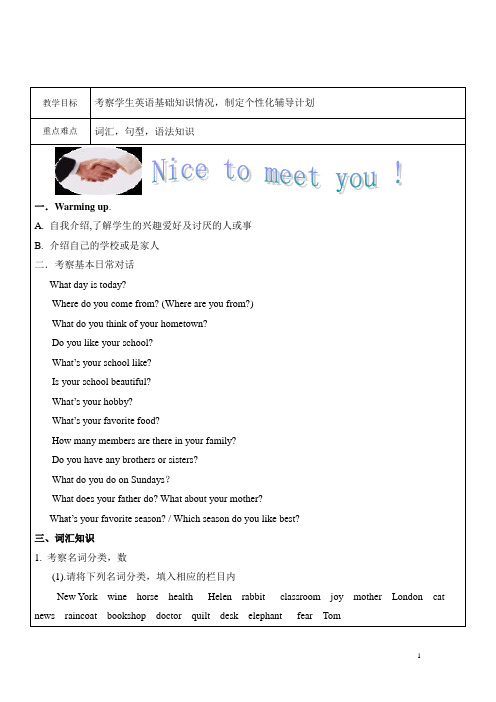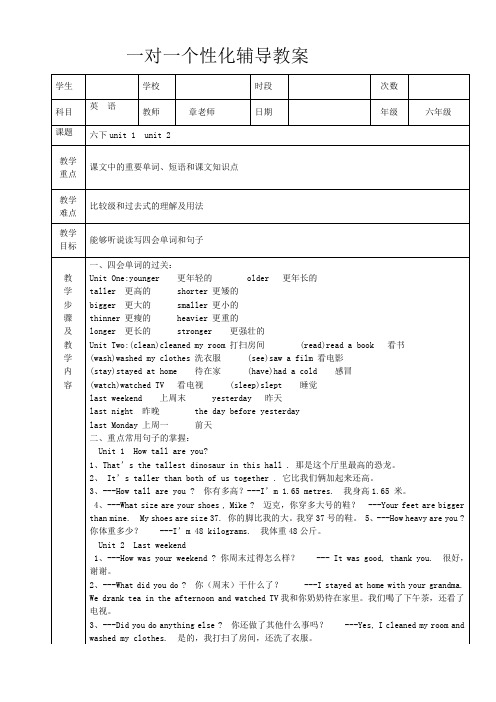六年级英语学科教师一对一辅导教案
六年级英语一对一辅导教案定稿2.doc

stop-stopped(停止)
4.以 “辅音字母+y”结尾的,变y为i, 再加-ed,如:study-studiedcarry--carried
直接+ed的动词过去式:watch(watched TV看电视)wash—washed the clothes洗衣服
clean—cleaned the room打扫房间play—played football踢足球
例:A: What did you do last weekendB: I Played football.
2.Did引导的一般疑问句,就过去是否发生了某行为动作进行问答:
--- Did you +动词原形--- Yes, I did. No, I didn't.
例:A: Did you read books
Go swimming—went swimming去游泳go fishing—went fishing去钓鱼
read—read读go hiking—went hiking去郊游
Unit 4:
leran Chinese—learned Chinese学汉语sing and dance—sang and danced唱歌和跳舞
同上
能够听说读写四会单词和句子,并且对一般过去式有所了解,并且会应用。
一、四会单词的过关:
Unit 3:
watch—watched看wash—washed洗clean—cleaned打扫
play—played玩visit—visited看望do—did
last weekend上一个周末go—went去go to a park—went to a park去公园
六年级英语一对一教案 7

教学内容六年级上册Unit 1预习教学目标掌握六年级上册Unit 1单词和句子教学重、难点重点:六年级上册Unit 1单词和句子难点:综合训练Step 1:热身训练Mike is a clown. He works in a circus. The circus is called The Big Top Circus. Mike does not live in a house. He lives in a caravan(拖车).The show starts at 7 pm. At 5 pm Mike goes to his caravan to paint his face. He paints his face white and his lips red. Next he paints two big, black around his eyes. Then he puts on his clown clothes. After that he puts on his big, black shoes. Then he puts on his orange wig(假发)and his funny, red nose. ( ) 1.Mike is a ___________.A.teacher B.doctor C.clown D.driver( ) 2.Where does Mike live?A.In a house. B.In a caravan C.In a hotel D.In an inn.( ) 3.What time does the show start?A.At 5 pm B.At 7 pm C.At 5 am D.At 6 pm( ) 4.What colour does Mike paint his lips?A.Green B.Black C.White D.Red( ) 5.What is the last thing he does?A.He puts on his funny, red nose. B.He puts on his wig.C.He paints his face white. D.He paints two black circles.Step 2:Unit1 How Do You Go There? (你怎样去那里?)重点单词:on foot= walk走路by bike骑自行车by bus坐公车by train坐火车by plane坐飞机by ship坐轮船by subway坐地铁near近的far远的usually通常sometimes有时候easy简单的the fifth floor第五层楼traffic lights交通灯traffic rules交通规则stop停止wait等待get to到达same相同的mean意思是driver司机right右边left左边must必须know知道一. 填入所缺字母,并写出相应的中文意思:kn w pl ne tr ff c tr n b s b ke sh p s bw y h w st p二.选择填空:1.I usually go to school foot.A.by;B.at;C.on2.--- is the boy? ---He’s Tom.A.What;B.Who;C.How3.--- are you doing? ----I’m reading.A.What;B.When;C.How4.---- is on the river? ---Some ships.A.Who;B.Whom;C.What5. apple do you want,the big one or the small one?A.What;B.Which;C.Whose6. ---- can I go to Shanghai/ ---You can go by plane.A.Where;B.How;C.What7. ---- is your brother. ----He’s ten.A.How;B.Where;C.How old8. ---- books do you have? ---I have ten.八.判断有没有共同的读音name plane ( ) pig big ( ) bike dish ( )team deal ( ) park great ( ) foot school( )bus but ( ) stop go ( ) seven sure ( )five fifth ( )练习题B:5、Write the words(写单词)10%6、Write the notes(看图,照样子标注)12%7、Read and choose(读句子,选择适当的内容填空)10%(1) How do (you/ your) go to England?(2)My school is near my home. It is not (near/far).(3)Let’s go to the bus stop (on/by) foot.(4) Our classroom is on the (two/second) floor.(5) See you (in/at) 9 o’clock.8、Read and match(句子搭配)(10%)A. How do you go to the supermarket? a. Sure, if you like.B. Can I go on foot? b. It’s near a fast food shop.C. Where is your home? c. I go there by the No. 15 bus.D. Look at the traffic lights. d. you can get there on foot. It’s not far.E. How can I get to the bookstore? e. We must stop.9、读句子,根据句子意思从A、B、C中选择正确的选项填空(10%)( )(1). How she go to the park?A. is B. does C. do( )(2). We go to the USA .A. by ship B. buy ship C. at ship( )(3). If the traffic light is yellow, we must .A. go B. wait C. stop( )(4). In China, drivers drive the side of the road.A. on; leftB. in; rightC. on; right( )(5). We can go to school foot.A. by B. on C. in( )(6). at a green light.A. Go B. Stop( )(7). In England, drivers drive on the side of the road.A. right B. left( )(8). 你告诉别人打算骑自行车去周游世界时,应该说:A. I’m going to go around the world by car.B. I’m going there by like.C. I’m going to go around th e world by bike.( )(9). 当你询问别人怎样去Australia时,应该说:A. Do you go to Australia by plane.B. How do you go to Australia.C. Where is Australia?( )(10). It means .A. by bikeB. no bikes10、阅读理解并填空(14%)rules, go, lights, sometimes, by, wait, RedI am a university students. I like reading. Every week, I to Xin-hua Bookstore. Usually I go there bus, but I go by bike. I know the traffic are the same in every country. Means stop. Yellow means and green mean go. But some traffic are different. In Australia, people go on the left side of the road, but in China we go on the right side. If you go to Australia, remember it.检测得分:__________________ 本周作业讲义剩余练习上周作业完成情况教学主管日期、时间学生签名。
六年级英语一对一教案 6

教学内容音标学习、五年级上知识复习教学目标五年级上知识复习、音标学习教学重、难点重点:五年级上知识复习、音标学习难点:综合训练Step 1:语音题训练找出画线部分读音不同的单词,并把标号填入题前括号内。
( ) 1. A. banana B. cap C. glass D. father( ) 2. A. happy B. any C. hurry D. yellow( ) 3. A. much B. bus C. mug D. ruler( ) 4. A. seat B. see C. the D. evening( ) 5. A. pen B. great C. desk D. leg()1. A. big B. six C. nice D. miss()2. A. work B. wall C. whose D. watch ()3. A. sorry B. brother C. some D. does()4. A. yesterday B. family C. day D. Monday ()5. A. hear B. pear C. ear D. near ()6. A. map B. stamp C. face D. cat ()7. A. three B. those C. their D. theseUnit 1:young (年轻的)funny (滑稽可笑的)tall (高的)strong (强壮的)kind (和蔼的、亲切的)old (年老的)short(矮的)thin (瘦的)Mr (先生)like (像、喜欢)strict (严格的)smart (聪明的、巧妙的)active (积极的、活跃的)quiet (安静的、文静的)very(很、非常)but (但是)Unit 2:Monday (星期一)Tuesday (星期二)Wednesday (星期三)Thursday(星期四)Friday (星期五)Saturday (星期六)Sunday (星期天)day (天)have (有、吃)on (在…..时候)do homework (做作业)watch TV (看电视)read books (读书)Unit 3:eggplant (茄子)fish (鱼)green beans (青豆)tofu (豆腐)potato (土豆)tomato (西红柿)for (为)lunch (中餐)we(我们)tasty (好吃的)sweet (甜的)sour (酸的)fresh(新鲜的)salty (咸的)favourite (最喜欢的)they are (他们是)fruit (水果)grape (葡萄)Unit 4:cook the meals (烧饭)water the flowers (浇花)sweep the floor (扫地)clean the bedroom (打扫卧室)make the bed(铺床)set the table (摆饭桌)wash the clothes (洗碗碟)do the dishes (收拾衣服)use a computer (使用计算机)Unit 5:curtain (空调)trash bin (垃圾箱)closet (壁橱)mirror(镜子)end table (床头柜)bedroom (卧室)kitchen (厨房)bathroom (卫生间)living room (客厅)in (在…里面)on(在…上面)under (在…下面)near (在..旁边)behind (在…后边)clothes (衣服)Unit 6:river (河流)flower (花)grass (草)lake (湖泊)forest(森林)path (路)pake (公园)picture (照片)hourse (房子)bridge (桥)tree (树)road (公路)building (建筑物)clean (干净的)三会单词from来自Canada 加拿大principal校长university student大学生Miss 小姐wait等等yeah 行,是play computer games 玩电脑游戏I’d like=I would likecabbage 洋白菜pork猪肉mutton 羊肉healthy 健康的now 现在have to 不得不eat 吃do housework 做家务very much 非常;很多empty the trash 倒垃圾put away the clothes 收拾衣服air-conditioner 空调on the farm 在农场over 在……上面in front of 在……前面sky 天空cloud 云mountain山;山脉village 乡村city 城市一、听录音,选出句子所提及的信息,把字母编号写在括号内。
六年级下册英语一对一家教辅导教案复习课程

六年级下册英语一对一家教辅导教案一对一个性化辅导教案()A. helpB. helpedC. helping(7)I’m hap py you feel ______ now.()A. goodB. betterC. well(8)Last weekend, we ______ for a picnic and ______ a good time.()A. go; haveB. went; haveC. went; had(9)He ______ football with his classmates yesterday afternoon.()A. didn’t playedB. didn’t playC. don’t play(10)I wanted to watch TV ______ the TV didn’t work.()A. andB. butC. then3.Read and fill in the blanks. 根据图片和句意补全句子。
(10分)(1)—What did you do yesterday, Sarah?—I ___________________ .(2)—Did you play football with Zhang Peng yesterday afternoon, Mike?—No, I didn’t. I ___________________ at home.(3)-How was your weekend, John?-It was bad. I didn’t feel well and ___________________ all weekend.(4)Yesterday was an exciting day. I ___________________ with Mikein the nature park.(5)It was hot yesterday. So I ___________________ at home.4.Read and choose. 读一读,选择合适的句子补全对话。
六年级英语一对一教案

教学目标考察学生英语基础知识情况,制定个性化辅导计划重点难点词汇,句型,语法知识一.Warming up.A.自我介绍,了解学生的兴趣爱好及讨厌的人或事B.介绍自己的学校或是家人二.考察基本日常对话What day is today?Where do you come from? (Where are you from?)What do you think of your hometown?Do you like your school?What’s your school like?Is your school beautiful?What’s your hobby?What’s your favorite food?How many members are there in your family?Do you have any brothers or sisters?What do you do on Sundays?What does your father do? What about your mother?W hat’s your favorite season? / Which season do you like best?三、词汇知识1. 考察名词分类,数(1).请将下列名词分类,填入相应的栏目内New York wine horse health Helen rabbit classroom joy mother London cat news raincoat bookshop doctor quilt desk elephant fear Tom(四)看图片,补全单词1.He’s a tall b _ _.2.I can see a d _ _ _ in the picture.3.I’d like some f _ _ _ and r_ _ _ .4.My uncle is a f _ _ _ _ _.5.Welcome to our s _ _ _ _ _.6.This is a d _ _ _.7.My f _ _ _ _ _ is a d _ _ _ _ _.(1)(2)(3)(4)(5)( 6 ) (7)五.阅读理解,判断对错,正确的打√,错误的打Jane and Mary are good friends. Their families are in Shanghai now. Jane is from Britain and Mary is from America. They are in the same school. But they aren't classmates. Jane is in Class One. Miss May is her teacher. Mary is in Miss White's class. They study Chinese. They like it. They like Shanghai, too.( ) 1. Jane and Mary are good friends and classmates.( ) 2. Their families aren't in Shanghai now.( ) 3. Miss May is the teacher of Class One.( ) 4. Mary is in Class One.() 5. Jane and Mary study Chinese and they like it.总结:。
六年级英语一对一辅导教案定稿

一对一个性化辅导教案学生学校时段次数科目英语教师章老师日期年级六年级课题六下unit 1 unit 2教学重点课文中的重要单词、短语和课文知识点教学难点比较级和过去式的理解及用法教学目标能够听说读写四会单词和句子教学步骤及教学内容一、四会单词的过关:Unit One:younger 更年轻的older 更年长的taller 更高的shorter 更矮的bigger 更大的smaller 更小的thinner 更瘦的heavier 更重的longer 更长的stronger 更强壮的Unit Two:(clean)cleaned my room 打扫房间(read)read a book 看书(wash)washed my clothes 洗衣服(see)saw a film 看电影(stay)stayed at home 待在家(have)had a cold 感冒(watch)watched TV 看电视(sleep)slept 睡觉last weekend 上周末yesterday 昨天last night 昨晚the day before yesterdaylast Monday 上周一前天二、重点常用句子的掌握:Unit 1 How tall are you?1、That’s the tallest dinosaur in this hall . 那是这个厅里最高的恐龙。
2、 It’s taller than both of us together . 它比我们俩加起来还高。
3、---How tall are you ? 你有多高?---I’m 1.65 metres. 我身高1.65 米。
4、---What size are your shoes , Mike ? 迈克,你穿多大号的鞋? ---Your feet are bigger than mine. My shoes are size 37. 你的脚比我的大。
六年级英语一对一教案

一对一个性化教案教师姓名学生姓名年级年月日时段第几次课六年级教学内容:教学目标:二、教学重点、难点、疑点:一、授课提纲:二、学生对于本次课的评价:○特别满意○满意○一般○差四、教师对于本次课学生的评定:1、学生上次作业评价:○好○较好○一般○差2、学生本次上课情况评价:○好○较好○一般○差第一部分听,读,说(3)Jack and His DogI. Listen to the passage and decide which of the following statements are True and which are False .I. 听短文,判断下列哪个陈述是真实的,哪些是错误的。
Jack seldom gets together with his friends.He usually stays at home with his pet dog, Lucky.They sometimes go for a long walk in the park.Although Jack is often alone, he is never lonely.He always tells his friends that a dog is man's best friend.II.Listen to the questions about the passage and choose the best answer A. B.C or D.II.听短文,选择问题的最好答案A,B, C或D。
l. Who is Jack always with?2. How does Jack feel when he is alone?3. Who is Jack's best friend?4. Who is Lucky?5. Where do Jack and his pet sometimes go for a walk?EXERCISlES 练习I.Listen to the passage and decide which of the following statements are True and which are False .听短文,判断下列哪个陈述是真实的,哪些是错误的。
六年级英语一对一教案 3

教学内容音标学习、三年级知识复习教学目标三年级知识复习、音标学习教学重、难点重点:三年级知识复习、音标学习难点:综合训练Step 1:复习上节课音标单元音(12个)︱i:︱e, ee, ea she, sleep, tea︱ɜ:︱er, ir. ur, or her, girl, turn, work︱u:︱u, o, oo, ue, ou, ui ruler, to, food, blue, group, fruit︱ɑ:︱a, ar banana, garden︱ɔ:︱a, al, or, au, aw, ore, oor also, talk, horse, cause, law, before, door ︱ɪ︱i, e, ee, y, a it, become, coffee, body, orange︱ə︱a, o, or, er, u about, polite, forget, river, autumn︱ʊ︱u, oo, o, u put, cook, woman, sugar︱^︱o, u, ou come, bus, young︱ɒ︱o, a box, want︱e︱e, ea egg, bread︱æ︱ a map, andStep 2:新音标学习双元音(8个)︱eɪ︱a, ay, ai, ey age, play, rain, greyB:他是我哥哥。
B: He’s my brother.4.A:你有多少个苹果?A: How many apples do you have?B:10个。
B: Ten.5.A:你喜欢吃苹果吗?A:Do you like apple s ?B:是的;不,不喜欢B:Yes .I do . /No I don’t.6.A:我可以吃个莉吗?A:Can I have a pear?B:当然可以。
给你. B:Certainly. Here you are .7.A:我的尺子在哪里?A:where is my ruler?B:在椅子上。
- 1、下载文档前请自行甄别文档内容的完整性,平台不提供额外的编辑、内容补充、找答案等附加服务。
- 2、"仅部分预览"的文档,不可在线预览部分如存在完整性等问题,可反馈申请退款(可完整预览的文档不适用该条件!)。
- 3、如文档侵犯您的权益,请联系客服反馈,我们会尽快为您处理(人工客服工作时间:9:00-18:30)。
六年级英语学科教师一对一辅导教案学员编号:年级:小六课时数:3 学员姓名:XXX 辅导科目:英语学科教师:徐颖课题Unit 3 What are you going to do?教学目的1.掌握be going to do 句型表示计划,打算的用法;2.掌握用what, when,where 对be going to 句型提问;3.掌握be going to 的否定形式和一般疑问的形式。
教学内容Step 1: Homework checkingStep 2: Lead-in询问学生放学后打算干什么,引出本课重点句型:What are you going to do?Step 3.Teaching key pointsA.重点句型What are you going to do? 你打算/想要去干什么?Where are you going? 你打算/想要去哪里?When are you going to …你打算/想要什么时候去…?be going to do……时态:一般将来时态定义:_________________________________________________________________ _________________________________________________________________ 标志词:_________________________________________________________________ _________________________________________________________________Practice:老师用英语提问,请根据先用汉语造句:T: What are you going to do tomorrow?_________________________________________________________________T: What are you going to do this Sunday?_________________________________________________________________T: Where are you going after school?_________________________________________________________________T: Where are you going tomorrow?_________________________________________________________________T: Where are you going next Sunday?_________________________________________________________________T: When are you going to school tomorrow morning?_________________________________________________________________T: When are you going to buy books?_________________________________________________________________<先看自己的汉语句子思考,你回答的这些事情都完成了没?做了没?>我们刚复习的表示将要,打算做某事的句型是:_________________________________________________________________am 主语人称为第一人称时,即:Ibe is 主语人称为第三人称时,即:he, she, your mother, his friend……are 主语人称为第二人称或表示复数的时,即:you, your parents/friends…我们刚造的句子都是以第二人称you 作为主语的,所以在be going to do 这个句型中,我们都应该使用的是:are going to doPractice: 将上面自己造的汉语句子用英语翻译出来。
_______________________________________________________________________________________________________________________________________________________________________________________________________________________________________________________________________________________________________________________________________________________________________________________________________________________________________________________________________Wow!You’re so cool!Let’s try again! 根据答句提问。
1.我打算这周六去动物园。
_________________________________________________________________2.我打算下周四去书店。
_________________________________________________________________3.我打算明天去北京买衣服。
_________________________________________________________________刚刚我们练习的都是以第一,二人称作为主语的。
现在我们来练习一下其他情况吧!Are you ready?Practice: 我是小小翻译家。
1.我妈妈打算明天去书店。
_________________________________________________________________2.我父母想要这周日去远足。
_________________________________________________________________3.我明天想去放风筝。
_________________________________________________________________4.你的妹妹这周日准备干什么啊?_________________________________________________________________5.我哥哥下周三想去钓鱼。
_________________________________________________________________6.他们明年准备去美国。
_________________________________________________________________7.他的姐姐下个月打算去北京。
_________________________________________________________________8.你打算下周五什么时候去电影院?_________________________________________________________________9.你爸爸这周日打算去哪里?_________________________________________________________________10.那对双胞胎今天晚上打算去游泳。
_________________________________________________________________(没答对两道题,可以涂黑一颗星星。
今天,你是几星级的翻译大师?)关于be going to do 句总结刚刚句子中出现的重点短语:_____________________________________________________________________________________________________________________________________________________________________________________________________________________________________________________________________________________________________________________________________B.重点句型be not going to do 不打算,不准备干某事例如:I am not going to school this Friday. 我这周五不准备去学校。
He is not going to Beijing next year! 他明年不打算去北京。
My father is not going to do sports tomorrow. 我爸爸明天不想做运动。
They are not going to the cinema this afternoon. 他们今天下午不打算去电影院。
通过例句,你能总结出什么规律吗?__________________________________________________________________________________________________________________________________Practice:翻译句子:1.我下周末不打算去游泳。
_________________________________________________________________2.我爷爷明天不打算去公园。
_________________________________________________________________3.我妹妹明年不打算学钢琴。
_________________________________________________________________4.他们一家下个月不打算去英国。
